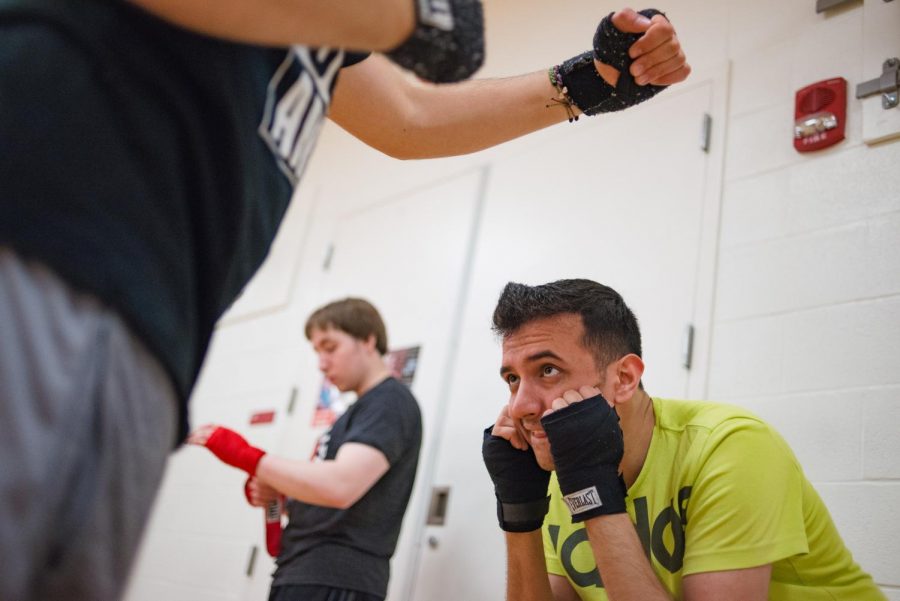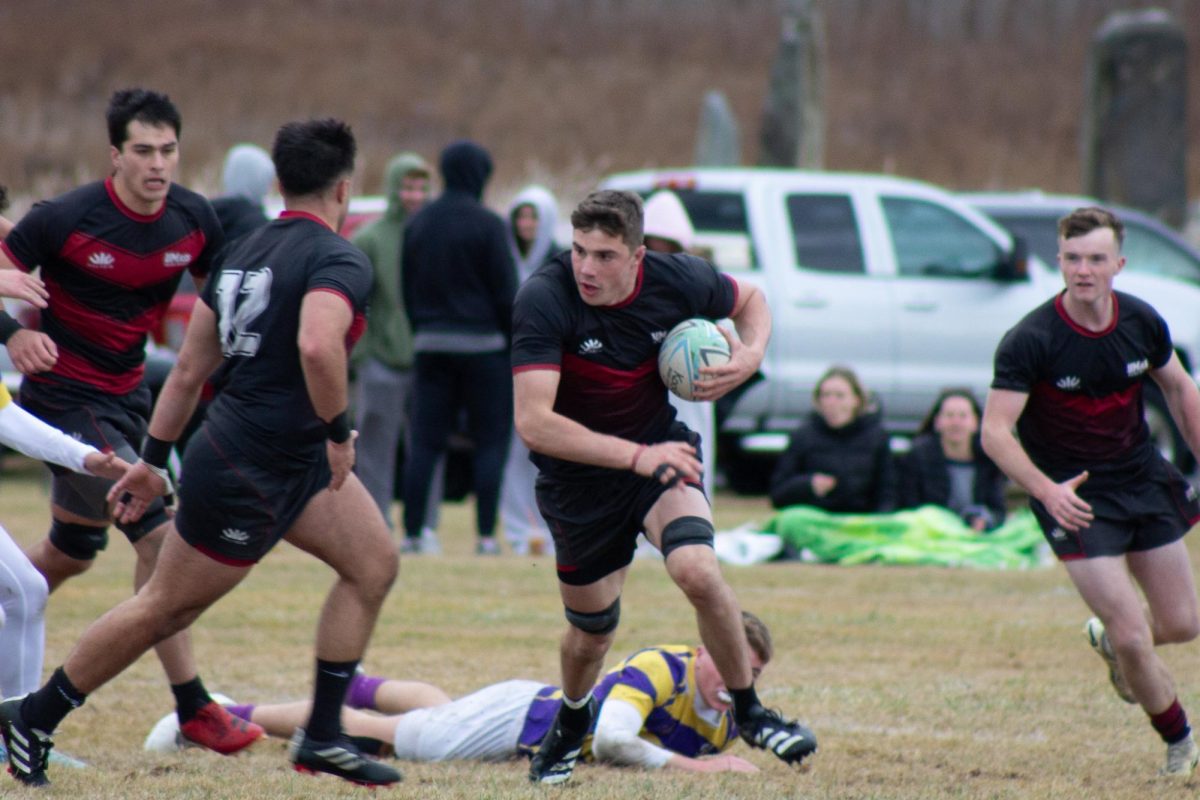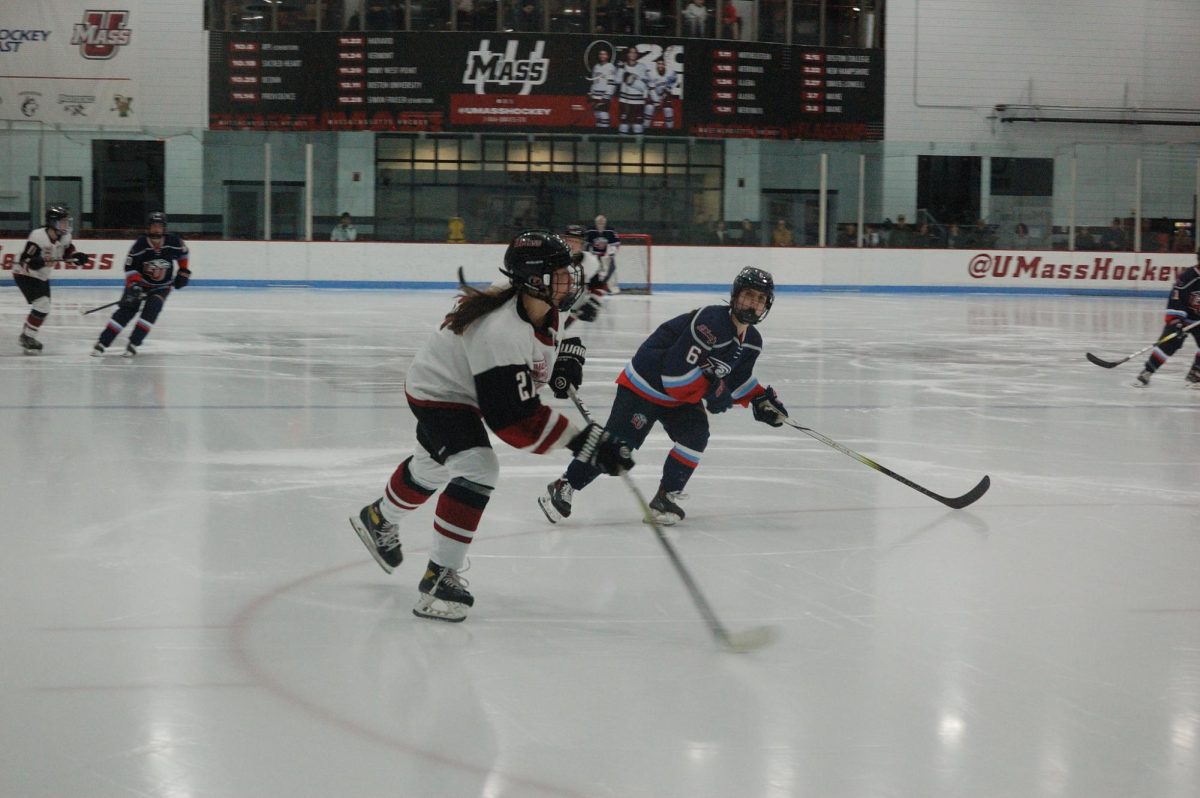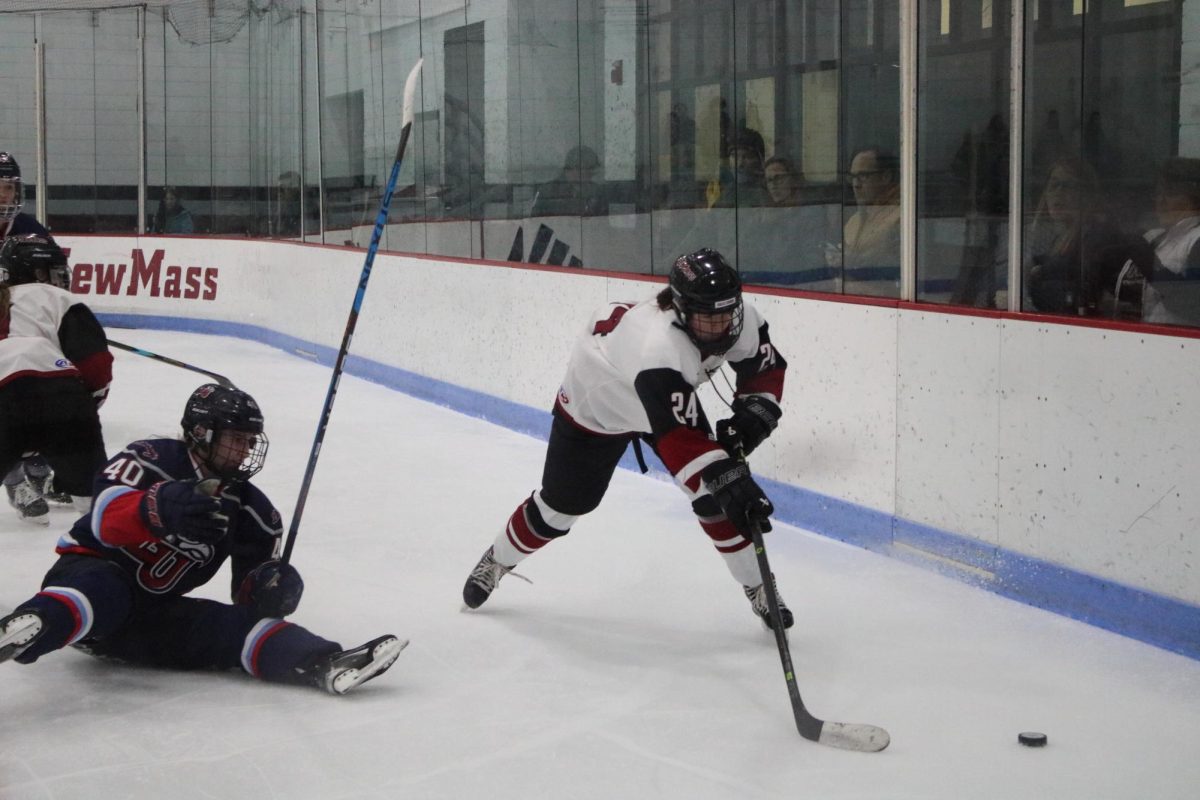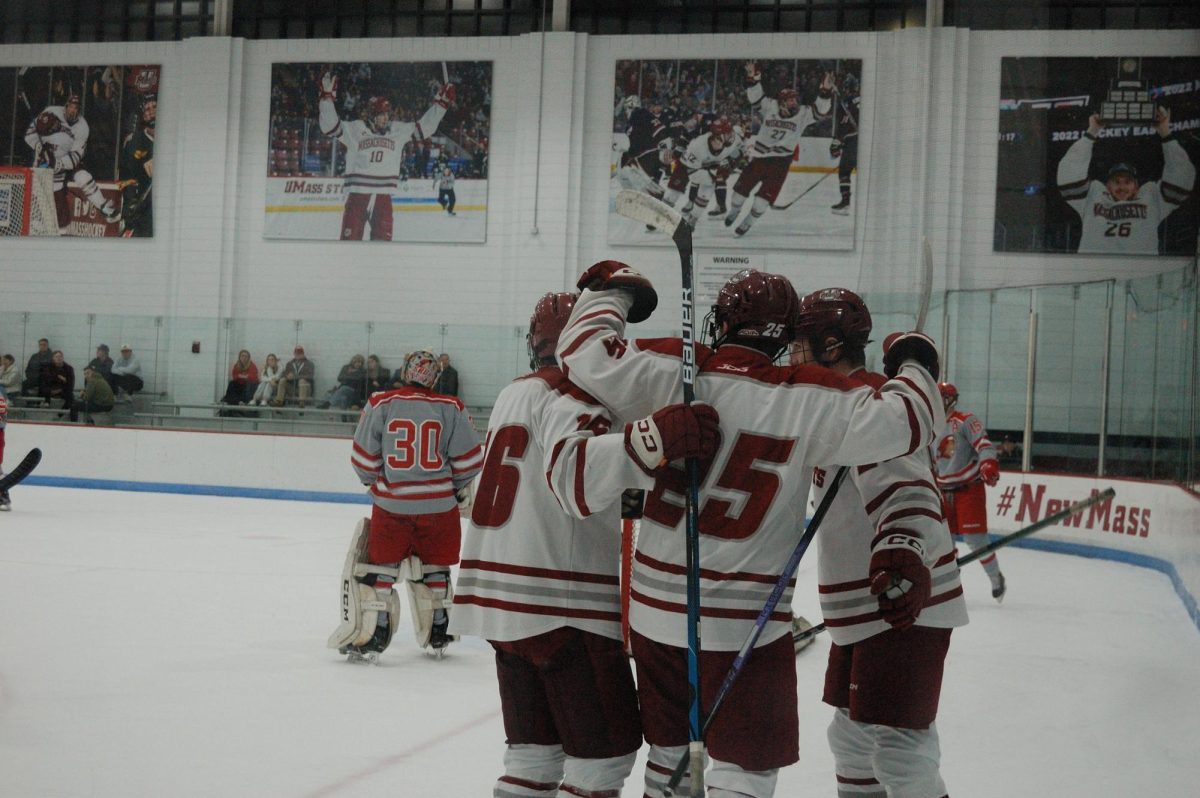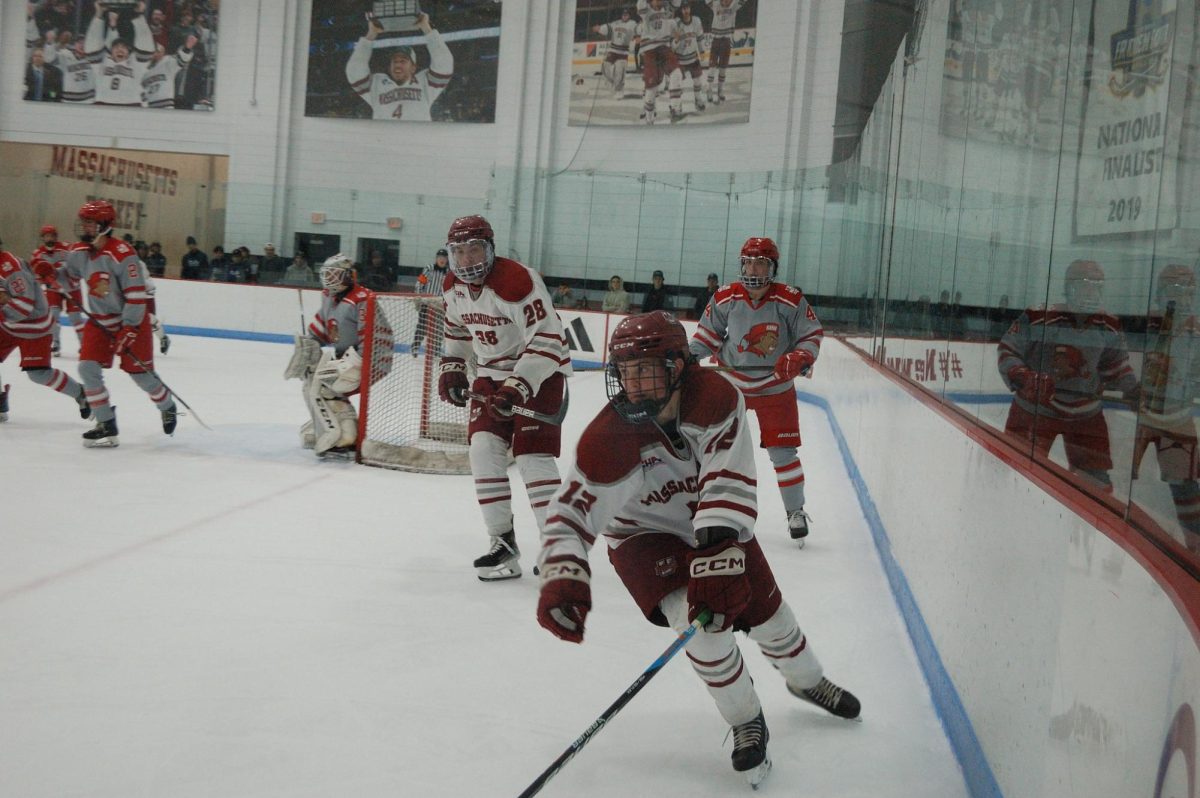There’s really no way around it — Mondays suck. Monday mornings, especially. It’s not a revolutionary idea. Everyone knows that by Monday, you better have put last weekend’s antics in the rearview and be ready to hunker down and grind.
Still, for most college kids, the daunting prospect of getting through five more days until next weekend is enough for them to blow off their 8 a.m. class and hide under the covers. But some members of the UMass boxing club aren’t most college kids.
On Monday mornings, the UMass boxing club holds off-campus training sessions at Westover Air Reserve base in Chicopee — about a half-hour drive from campus — at “0600.” That’s military language for 6 a.m. Ten to 20 club members will set their alarms for 5 a.m. — perhaps even earlier — so that they are up in time to carpool over to the base to spar and practice, rising at dawn every Monday to get punched in the face and pushed to their physical limits.
So why do they do it? A large part of that answer has to do with the guy who’s coaching them. The guy who guided Josh Lopez to two back-to-back collegiate national championships in 2012 and 2013. The guy who’s taken total newbies of the sport and molded them into Western, Central and All New England Golden Gloves winners. The guy who started the whole boxing program at UMass in the first place.
His name is Rocky Snow.
***
It’s a dreary Wednesday night in late September. Rain pours down in sheets outside. The basketball courts at the UMass Recreation Center are packed. The sounds of bench presses and deadlifts ring out from the upstairs weight room. The Courtside Cafe, however, is relatively quiet; many tables remain unoccupied.
Rocky Snow approaches. The folded bill of a navy blue veteran’s cap hangs low over his forehead. Bespectacled, he wears a soaking wet overcoat and carries a briefcase in one hand by his side. Though somewhat short in stature — maybe 5-foot-6 — there is a robust aura to him that commands respect. He folds his hands on the table. They are absolute mitts—his fingers are the width of hot dogs, his palms as thick as a McDonald’s double quarter pounder.
Which makes sense, considering he fought professionally for eight years. “I was a brawler,” recalls Snow, a faint smile coming to the corners of his lips. His speech is raspy and deliberate. “I have very short arms. So when I fight I’m like your shadow. Where you go, I go. You hit me, I hit you. You hit me, I hit you. One of us is gonna go down…That worked for me.”
Snow first got involved with the sport in 1975 after returning home from Vietnam, where he’d served with the Marine Corps. Upon coming home, his emotions and behavior had grown increasingly volatile, and he was in need of an escape, an outlet. “I had started smoking when I was in Vietnam. I just didn’t feel healthy,” he says. “When I came home from Vietnam I was angry, hateful, I didn’t like anything, anybody or anyone. And I’m walking around like a loose cannon. I knew that something was wrong.”
He could have easily channeled his flutter of emotions into drug or alcohol use, as many of his Marine brothers had. “But then I’m thinking, ‘Well then I’ll have another problem on top of that,’” he reasons. “So what I did, I went to physical fitness. So I took martial arts, then I got into boxing, so that’s what I’ve been doing. And boxing for me was therapeutic. The only reason why I got into boxing was because it was therapeutic.
“Because all of a sudden I wasn’t angry, I wasn’t hateful, [I wasn’t] not looking for a fight.”
At first, after coming home from Vietnam, Snow had been going to the Holyoke Boys Club with a friend just to play basketball and swim, as a way to stay healthy and keep his spirits up. The prospect of boxing had never even crossed his mind. But, “the boxing ring was right there, so the coach came out and he says ‘How much do you weigh?’ I go ‘156.’ He says ‘Well I got a kid in here, Mike Griffin, he weighs 160. He needs someone to spar.’”
A former Marine, Rocky Snow never backed down from a challenge. He jumped at the opportunity. “So I went in there and I lasted one round.”
“Only because I was out of breath,” he clarifies. He was back in the ring the very next day, challenging the same guy. Again, though, Snow lasted just one round to due poor cardio.
So, what’d he do? Over the ensuing six weeks, he proceeded to train and run 7.5 miles every day. By the time the Golden Gloves came around at the end of the six weeks, Snow had dropped 30 pounds and won the tournament at 126.
“When I was in a fight,” Snow says. “I didn’t care about who my opponent was. I didn’t care [about] anything.”
That mindset would change drastically, though, when he took up coaching the sport after his professional days ended — then Snow’s Marine background really kicked in.
“In the Marine corps you watch your brother’s back,” he says. “You always watch your brother’s back. So I have [that] military concept when I coach. That’s why I’m hardcore.”
Due in large part to this approach, no one has ever been seriously injured under his watch, a fact that Snow takes tremendous pride in. “A lot of coaches just put them in and figure they’ll just get the experience. Well, I’m not gonna do that,” he asserts. “That’s why I have no one hurt under my watch, because I don’t put people where they shouldn’t be.
“[The only time] I’m gonna put him in there is [if there’s a] 50-50 shot. Because mentally — people think boxing is physical — but it’s equally mental,” Snow continues. “Because if you get hurt, mentally, your confidence in yourself, your confidence in your ability will last a lot longer than a pulled muscle. The physical part will heal, the negative part can be there for a long time.”
Snow’s first coaching opportunity came with the Chicopee Boys club, who contacted him shortly after his pro career ended, wanting him to start up a boxing program there. After a year, though, Holyoke — Snow’s “home spot” — came calling, seeing if he was interested in starting a feeder program for kids aged 8-15. Snow accepted the opportunity.
“My first year in Holyoke they go, ‘Holyoke who?’ Because they know Holyoke for Golden Gloves but not for Junior Olympics,” Snow says. “Then the next five years we were the number one team in New England.”
Following his stint at Holyoke, Snow went on to coach at Western New England and Central Connecticut State, before ending up at UMass. His praise for the distinguished boxers who’ve fought under him at UMass is endless, but the opposite holds true as well. For Meiya Berkey and Sean Donnelly, their relationship with Snow and the lessons imparted by him have been invaluable.
“He’s more than a coach, he’s a life mentor,” says Donnelly, a three-time captain from 2014-2017. “He’s served in that capacity for me, obviously…he molds young people into adults. He taught me how to be a man, basically, and not take s— from anyone.” Donnelly even went as far as to describe his relationship with Snow as “father-son [like.]”
As a freshman, Berkey—a two-time Western New England Golden Gloves champ and an All New England Golden Gloves champ at 106 pounds — had no intentions of competing or even going to spar at the Westover Air Reserve base in Chicopee. She was adamant about only attending the group practices on Wednesday nights in the Rec Center to hit pads and learn technique, as UMass does not allow sparring on campus.
“And then by November I was down sparring and then by January I had my first fight, so he’s the most persuasive person I’ve ever met,” Berkey reminisces with a laugh. “But yeah, [he’s shown] all-around support.
“I have a long history of accomplishments that I’ve done. But I never was like, ‘Oh I’m gonna do all of that.’ You just put yourself out there see what happens. If you don’t even try, then that’s definitely not gonna happen. So he’s definitely instilled that in me.”
In recent years, one could say UMass boxing has cooled off from its hot start. Last year, UMass only sent one fighter to nationals — Berkey — and overall, the program has had difficulty filling the enormous shoes Josh Lopez left behind.
“We just aren’t reaching the people we need to reach,” Berkey admits. “So we just haven’t had the number of people who are willing to put themselves out there…So we’re trying to increase participation and get people to just enjoy the sport the way [the experienced members of the club] do.”
In the meantime, all that Snow and his fighters can do is keep grinding and getting better. At the end of the day, Snow reminds his fighters, the main point is “to have fun; this is recess.”
Regardless of how long it takes UMass boxing to build itself back up to where it was in 2012 and 2013, coach Rocky Snow is going to keep advancing his safety-first mantra, and he’s going to continue molding many more young men and women here on campus.
Not just into stronger fighters, but stronger individuals, as well.
Ben Painchaud can be reached at [email protected].

